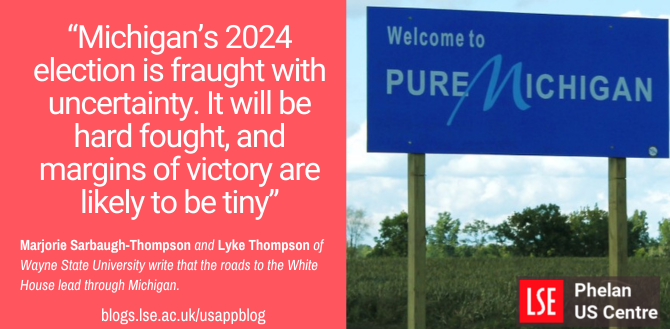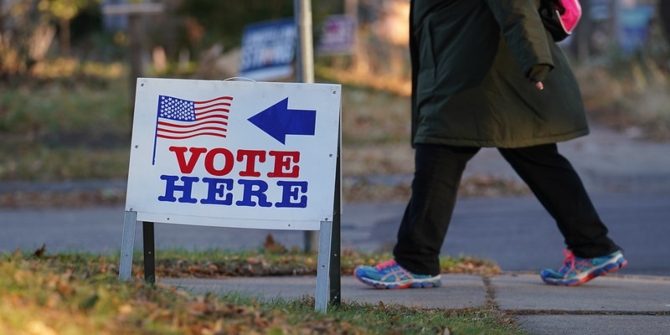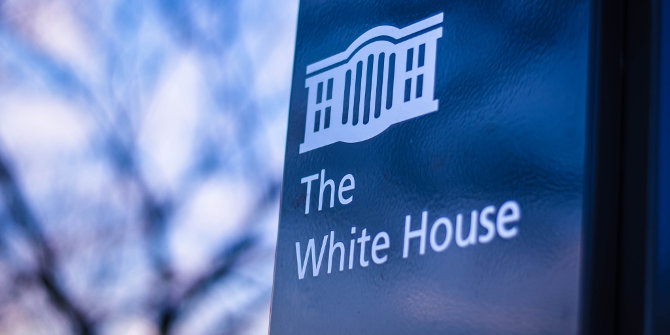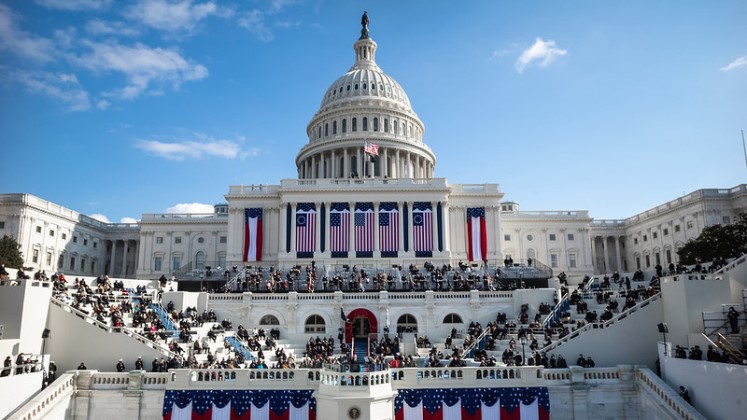
 On February 27th Michigan will hold primary elections for both the Democratic and Republican parties, and on March 2nd the Republicans will hold an additional caucus. Ahead of the primaries and caucus, Marjorie Sarbaugh-Thompson and Lyke Thompson take a close look at how the Great Lake State moved from being part of the Democrats’ “Blue Wall” before the 2016 election to a state that the results of the 2024 election may hinge on. They write that in Michigan, the parties are troubled either by factionalism, for the Republicans, or policy disagreements with their base, for the Democrats, factors which mean who will win in November is still anyone’s guess.
On February 27th Michigan will hold primary elections for both the Democratic and Republican parties, and on March 2nd the Republicans will hold an additional caucus. Ahead of the primaries and caucus, Marjorie Sarbaugh-Thompson and Lyke Thompson take a close look at how the Great Lake State moved from being part of the Democrats’ “Blue Wall” before the 2016 election to a state that the results of the 2024 election may hinge on. They write that in Michigan, the parties are troubled either by factionalism, for the Republicans, or policy disagreements with their base, for the Democrats, factors which mean who will win in November is still anyone’s guess.
- This article is part of ‘The 2024 Elections’ series curated by Peter Finn (Kingston University). Ahead of the 2024 election, this series is exploring US elections at the state and national level. If you are interested in contributing to the series, contact Peter Finn (p.finn@kingston.ac.uk).
In the past decade, Michigan has become a bellwether state, mirroring national tallies in the last two US presidential elections, first providing the crucial edge for Trump in 2016 and then Biden in 2020. This year it may do so again, depending on an array of conflicts and trends.
From Blue Wall to a key state in the 2024 election
Before 2016 Michigan was part of the infamous “Blue Wall” of Democratic support. Then Donald Trump won the state by 0.23 percent or 10,704 votes—the narrowest of his victories in any US state. Subsequently, Michigan helped seal Biden’s victory by a margin of nearly three percent or 164,892 votes. Recent polls for the 2024 presidential election in the state have swung between Biden and Trump.
Despite the importance of the state to the fortunes of the two major political parties, both face challenges that could undermine their chances of victory at the state and national levels in 2024.
GOP Factionalism
Factions within the Michigan Republican Party have been battling fiercely over who is the State Republican Party Chair, and that appears to have hurt their fundraising and their ability to create a unified political message. Michigan’s Republican Party had a history during the 20th century of moderation with some of its politicians exemplifying bipartisanship and compassionate conservatism (fiscally conservative, but socially moderate). For example, Michigan’s longest serving governor, Republican Bill Milliken, who was described in his 2019 obituary as an environmental advocate and strong supporter of Detroit, backed Democratic Presidential candidate Hillary Clinton in 2016.
Remnants of his moderate wing of the Republican Party oppose the “stop the steal” faction that walks in lock step with Donald Trump. After 2022’s double-digit losses by statewide Republican candidates from the “stop the steal” wing of the party, Michigan’s Republican Party voted to oust its current state party chair, Kristina Karamo, and replace her with a conservative former US Representative, Pete Hoekstra. Although Hoekstra was a founding member of the Tea Party Caucus in the US House (a conservative insurgency in 2010), by today’s GOP standards, he appears far more reasonable than Karamo. The Republican National Committee (RNC) has created a task force to investigate who the leader of Michigan’s Republican Party really is. In the meantime, reports have surfaced that the state GOP is in a funding crisis with sizeable outstanding debts, which could make it harder to compete in general election contests statewide. Candidate Trump has waded in on the side of Hoekstra, but the RNC remains uncommitted. The delay matters because some observers think that it will be difficult for Michigan’s Republican Party to fill its coffers in time to compete in all the potentially competitive state elections coming up in 2024. Moreover, supporters of Karamo could become cynical and sit on the sidelines instead of working for the party’s candidates.
Fractured Democratic coalitions
The Democratic Party faces its own challenges. Nationally, the Democratic Party is struggling to hold onto its winning coalition of minority group and young voters due to Biden’s support for Netanyahu in the Israel-Gaza war. In Michigan, Arab American leaders, with support from some African American leaders, oppose further US support for Israel. Some estimates put the number of Arab American voters in Michigan at 300,000 of which nearly 70 percent voted for Biden in 2020. If those voters stay home or vote for third party candidates in 2024, Trump could win Michigan.

“Welcome to Pure Michigan Sign” (CC BY-SA 2.0) by formulanone
Among factors that cost Democrats Michigan’s 2016 Electoral College votes, turnout and third-party candidates loom large. The Green Party candidate, Jill Stein, received 51,463 votes in the 2016 Presidential contest; Trump’s margin of victory was 10,704. So, a broad defection Michigan’s youth, its Arab American voters and some portion of the African American voting community could easily cost Biden a victory in Michigan.
Other wildcards that confront the state political parties include laws (passed in 2018) that permit same day voter registration and laws that allow anyone to vote with an absentee or mail-in ballot. Additionally, 2024 will be the first year that Michigan provides early voting days (nine of them). All these factors could affect turnout by making it easier for some groups of voters to cast their ballot.
Ballot initiatives and State House elections
Ballot initiatives also could have a major impact on voter turnout and enthusiasm in Michigan. Having an initiative on the ballot to ensure Reproductive Freedom boosted turnout of supporters and opponents in 2022. Attracting these young voters to the polls likely helped Democrats win trifecta control of the Michigan House, Senate, and Governorship in 2022. It appears likely that the 2024 ballot will include a ballot initiative to raise the state’s minimum wage to $15 per hour. That initiative could increase turnout, but it is not clear which candidate these voters would prefer, given Trump’s popularity with voters who do not have a college degree, a group that might benefit from a higher minimum wage.
Michigan’s State House elections in 2024 also face uncertainty after a court ordered Michigan’s Independent Citizen Redistricting Commission to redraw a several State House and State Senate district boundaries. This decision, handed down in December of 2023, leaves some state house candidates wondering which voters will and won’t be their constituents for the 2024 election. The three-judge federal appeals court panel ruled that the maps violated the national Voting Rights Act, which requires that state maps provide opportunities for minority voters to elect their preferred candidates in some of the state’s districts. The court ordered the commission to redraw seven of the 110 state house districts and six of the 38 state senate districts. The commission confronts a short time frame to redraw the state house districts by the April 23rd deadline for candidates to file paperwork to run in the August state primary election. No one knows what the boundaries will be in the affected state house districts.
Presidential wildcards
In addition to all the above sources of uncertainty, the coming Presidential primaries in Michigan have their own wildcards. These primaries will not feature many candidates for voters in either political party. They will, however, provide a barometer of interest and turnout. Primary voters from both parties will have the option of voting for “uncommitted” delegates to the national convention. These uncommitted primary delegates do not have to cast their votes for a specific candidate during the first round of voting at the national party conventions, where the presidential candidates are officially chosen. Winners of party primaries receive delegates to these conventions that are required to vote for them during early rounds of voting.
On the Republican side, there will be a primary election on February 27th followed by a caucus on March 2nd. Most of Michigan’s Republican Party delegates will be chosen through the caucus rather than the primary election of delegates. This two-part process to select convention delegates favors Donald Trump. Additionally, both parties let party leaders and elected officials choose some delegates. Therefore, party leaders matter, and in Michigan there are currently county-level and state-level battles over Republican party leadership, as mentioned above.
Joe Biden faces one other candidate, Dean Phillips, a US House member for Minnesota, who is unlikely to reach the 15 percent primary vote threshold to receive party convention delegates. He does, however, face a growing movement spearheaded by Arab American Voters to vote for uncommitted delegates during the primary election. Michigan’s Democratic Party awards its national convention delegates partly on the statewide vote, but also partly by Congressional district. It is possible that “uncommitted” could receive enough support in Congressional district 12, which has a large number of Arab American voters and minority group voters to send a handful of uncommitted delegates to the Democratic Party Convention.
In sum, even though both party primary elections for presidential candidates look like easy victories for Biden and Trump, it’s a long time until November 2024. Michigan’s 2024 election is fraught with uncertainty. It will be hard fought, and margins of victory are likely to be tiny. Michigan could again act as a bellwether in the turbulent political winds of 2024.
- This article originally featured an image portraying Michigan, North Dakota, and has been updated with an image from the correct US state.
- Please read our comments policy before commenting.
- Note: This article gives the views of the author, and not the position of USAPP – American Politics and Policy, nor the London School of Economics.
- Shortened URL for this post: https://bit.ly/3SVLhI9






